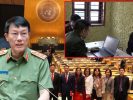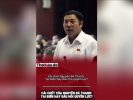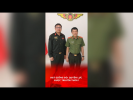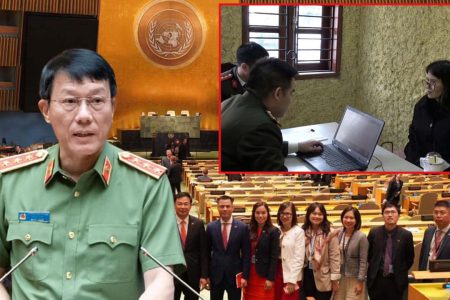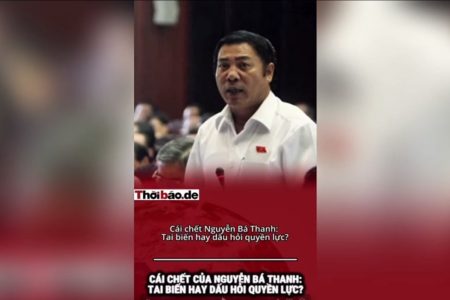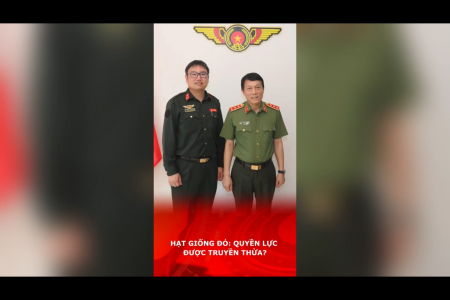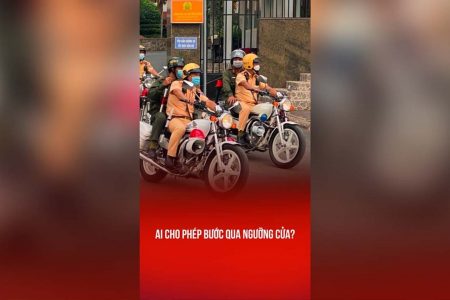
Protesters outside a court in Hanoi trying activists of the Brotherhood for Democracy on April 5, 2018
„Freedom of speech“ and „speech freely„
Thien Van’s author, titled „Ensuring freedom of speech, not promoting free speech,“ published on Vietnamnet.vn, July 31, cited evidence confirming that for decades, Vietnam has persevered and strived to implement solutions to ensure greater freedom of expression for the people.
Author Thien Van recalled that the First National Assembly of the Democratic Republic of Vietnam, 74 years ago, passed the Constitution 1946, in which Article 10 of the Constitution states „Vietnamese citizens have the right: Freedom of speech; freedom to publish; freedom of assembly; freedom of belief; freedom of residence and travel within and outside the country.”
It is worth noting that the author Thien Van pointed out that freedom of speech for citizens in the 1946 Constitution of the Democratic Republic of Vietnam was born 2 years earlier than UN’s Universal Declaration of Human Rights in 1948.
In addition, the article mentions the Law on Access to Information and the Press Law, which were promulgated in 2016 by the National Assembly with specific provisions to ensure freedom of speech. For example, Article 11 of the Press Law 2016 stipulates that Vietnamese citizens have the right to express their opinions about the situation of the country and the world; commenting on the Party’s guidelines and policies, the State’s laws; making suggestions, criticisms, recommendations, complaints and denunciations in the press to organizations and individuals.
However, author Thien Van emphasized that freedom of speech is limited, it is not permitted to promote free speech, to say anything because there is no absolute freedom, just analogy for that alone. Therefore, author Thien Van argues that freedom of speech is absolute, unlimited, and anarchic will lead to loss of control and cause social disorder.
The article also cites Article 11, the French Declaration of Human Rights and Civil Rights in 1789 and Clause 2, Article 29 of the UN’s Universal Declaration of Human Rights in 1948 providing for the responsibilities and limitations imposed by the law to protect ensure the freedoms of others are also acknowledged and respected.
Blogger Nguyễn Ngọc Gia had a critical article posted on RFA’s Blog page, one day after the article „Ensuring freedom of speech, not promoting free speech“ by Thien Van was published.
Blogger Nguyen Ngoc Gia said this article made a noise on social networks because of the use of words that he thought was „unlike anyone.“
On the evening of August 4, blogger Nguyen Ngoc Gia further explained his comments on the article by author Thien Van:
“I am sorry about that article. It seems that the author did not understand Vietnamese grammar, but is confused about ‘free speech’ and ‘speech freely.’ They were mistaken in anagram.
Secondly, if ‘free speech’ and ‘speech freely’ are two completely different concepts, then the person who came up with that concept and wanted to use it must first clearly define the difference.
Those are the two most important points. Thus, both in Vietnamese grammar and even in the new concept, the author could not achieve it. Therefore, this article falls into a fallacy called ‘naive argument’.”

Practices of „free speech“ in Vietnam
Lawyer Nguyen Van Dai, on the same day Aug 4, told RFA that the article of author Thien Van with the use of the word „anagram“ in order to „ignore and cause confusion“ to people in the country misunderstand the nature of freedom of speech and exercise their right to freedom of speech at the will of the Party and the State of Vietnam.
First of all, Lawyer Nguyen Van Dai talks about what the true nature of freedom of speech is:
“The nature of freedom of speech needs to be understood so that when people have discontent or have dissatisfaction with the Party and the Government, they have the freedom to express that annoyance through the press or social media. Once the right to freedom of speech is stated in the Constitution, it means that it has accepted the opposition of views, opinions and thoughts of the people and the government. That’s why the Constitution is needed to protect those rights. Even as Vietnam’s Press Law, though not explicitly stated, clearly defines that the right to freedom of speech and the right to press are that people are free to express their views on all issues such as economy, politics, society … domestically and internationally. The right to freedom of speech does not refer to saying good or bad and criticizing but the main purpose is for people to express annoyances or different political views to the government.“
However, Lawyer Nguyen Van Dai affirmed that the right to freedom of speech in Vietnam was determined by the Vietnamese Government as a citizen of Vietnam or any citizen of any country to use the right to freedom of speech to praising the Communist Party and praising the Government of Hanoi. For that acclaim individuals even receive money, through the application of the force of hundreds of public opinion workers every day devoted themselves to doing the same work as author Thien Van expressed through the article „Securing freedom of speech, not promoting free speech.“
Lawyer Nguyen Van Dai added that freedom of speech should be understood as freedom without limitation. However, the right to freedom of speech which Thien Van cited by the UN Universal Declaration of Human Rights in 1948 is limited between individuals. Because individuals are equal before the law, they cannot use their freedom of speech to insult others. And an individual who does so is subject to the punishment of the law.
“For example, writer Pham Thanh was arrested for writing articles that directly criticized Mr. Nguyen Phu Trong, personally. Nguyen Phu Trong should think that Mr. Pham Thanh insulted him, Mr. Trong has the right to sue Mr. Pham Thanh to court, to judge whether Mr. Pham Thanh violated the law or not. But in reality, Mr. Nguyen Phu Trong did not sue but the security agency in the name of the state arrested Thanh and charged him with ‘conducting anti-state propaganda’ because Mr. Nguyen Phu Trong was not an ordinary citizen but in the capacity of State President and the party’s General Secretary.“
Forced to exile abroad by the communist regime in 2018, Mr. Nguyen Van Dai, emphasized that in countries that practice according to the nature of freedom of speech, all citizens have the right to exercise their freedom of speech to criticize the regime and individual entities who hold positions from the central to local levels and earn wages from taxpayer money. That is not limited.
Lawyer Nguyen Van Dai and blogger Nguyen Ngoc Gia also noted that the article of author Thien Van was published on the same day of the trial of 8 members of the Constitution group, who were sentenced to a total of 40 years and 6 months of imprisonment on charges of „disrupting security“ under Article 118 of the 2015 Criminal Code.
Both lawyer Nguyen Van Dai and blogger Nguyen Ngoc Gia share the view that the article sent a message from the Vietnamese Government further confirmed that it would continue to tighten and strangle people’s freedom of speech.
The Vietnamese state has increased its control
Not only the people in the country, but the Vietnamese Government has increased its control over the freedom of communication of Vietnamese living abroad. That is the opinion of journalist Le Trung Khoa, owner of thoibao.de, in Germany.
“I find that the situation of free speech in the country is getting worse and worse. Specifically, there is increasing evidence of raids from home to abroad. In addition, arrests can be seen more and more. Many writers like Pham Chi Dung and other bloggers, Facebookers, etc. have been arrested and charged with extremely serious crimes and many years in prison. It clearly shows the violation of the people’s freedom of speech, press, and expression which are stated in the country’s Constitution.“
Khoa himself can be considered a „victim“ since he transferred information about Vietnamese agents to Germany kidnapping former state official Trinh Xuan Thanh in July 2017. Mr. Le Trung Khoa his news agency were continuously raided and threatened from then until now. He expressed:
“The current media is almost a very important front for Vietnam in the trend of more civilized development. But, the Communist Party of Vietnam does not want this because its monopoly on media and journalism is largely lost because people read more news from social media and overseas newspapers than from the state-controlled press which is considered only for reference. They realized that it would be dangerous for their tyrannical leadership, so they tried to silence critics by arrests, detention, and threats not only to domestic people but also to Vietnamese people abroad, by all means; including face-to-face meetings and discussions such as representatives of the Vietnamese Embassy met me to ask for mitigating information. Other forms of intimidation, such as the case of Son Dien, a Vietnamese who threatened to kill me. Of course, I live in a rule of law country, so I have the right to reflect these to the law enforcement agency and they will work.”
Living in Germany, journalist Le Trung Khoa and lawyer Nguyen Van Dai are protected by law enforcement agencies as they exercise their right to freedom of speech.
In Vietnam, as a citizen who was sentenced to prison for expressing his views, blogger Nguyen Ngoc Gia asserted that „Vietnamese authorities have criminalized the people’s acts of exercing the right to freedom of speech, although in theory the right is stated in the Constitution and the law. And, the best evidence is that Vietnam is ranked near the bottom of the table for press freedom, media freedom and the latest example by arresting a series of writers including Dr. Pham Chi Dung, writer Pham Thanh, poet Tran Duc Thach and journalist Nguyen Tuong Thuy …
Thoibao.de (Translated)

















